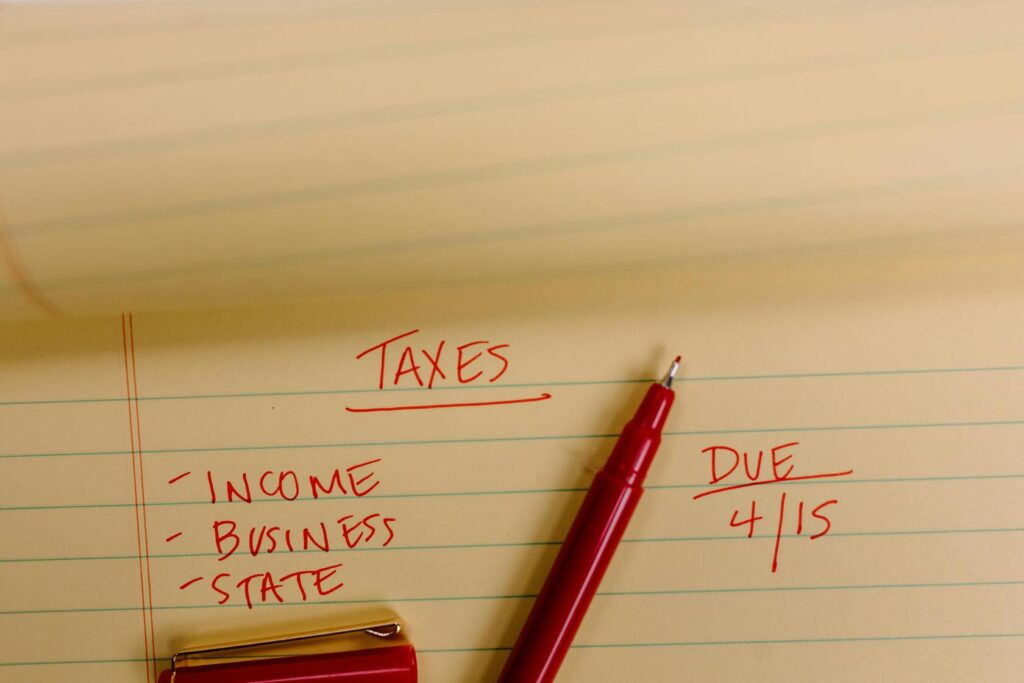Ensure your calendar is ready with all the crucial tax deadlines, potential extensions, and important considerations for both individuals and businesses in 2025. Don’t miss a date that could impact your financial planning!
Article Summary
Save yourself ~10 minutes of reading with this quick overview.
- Individual Income Tax Deadlines: Most individual income tax returns are due on April 15, except when it falls on a weekend or holiday. Filing Form 4868 can grant an extension until October 15.
- Quarterly Taxes for Self-Employed Individuals: Independent contractors, gig workers, and self-employed individuals need to make quarterly estimated tax payments on specific dates throughout the year.
- Deadlines for Partnerships and S-Corps: Partnerships, including multi-member LLCs, and S-Corporations generally have a filing deadline of March 15, unless operating on a fiscal year. Filing Form 7004 can extend the deadline by six months, making it September 15 or five months after the original due date.
When natural disasters such as hurricanes, earthquakes, tornadoes, floods, wildfires, or blizzards occur, the IRS may grant extended federal tax deadlines for affected individuals and businesses, provided a federal disaster declaration is issued. These extensions typically cover a wide range of federal tax obligations, including income tax filings (like estimated tax payments), payroll taxes, and excise taxes. The extended deadlines provide much-needed flexibility during challenging times. To find out if you qualify for an automatic filing or payment extension, visit the IRS Disaster Relief page for up-to-date information and guidance on how to proceed. Being proactive can help ease your financial burden.

What are the 2024 Tax Deadlines?
Understanding when your 2024 taxes are due is crucial to staying compliant and avoiding penalties. If you’re a calendar year filer, your tax return is typically due on April 15, 2025. This is the final date to file your taxes without requesting an extension, unless it falls on a weekend or holiday, in which case the deadline is moved to the next business day. Many individuals follow the calendar year filing system, making April 15 the key date to remember.
However, if you need more time to file, you can submit Form 4868 to request an extension, which gives you until October 15, 2025, to submit your tax return. It’s important to note that an extension to file doesn’t mean an extension to pay; you must still pay any owed taxes by April 15 to avoid interest or penalties.
For businesses operating on a fiscal year, the filing deadline generally falls on the 15th day of the third or fourth month following the close of your fiscal year. For example, if your business’s fiscal year ends on June 30, your return will typically be due on September 15. If this deadline lands on a weekend or holiday, it will be moved to the next business day.
These key filing dates are important, but they’re not the only deadlines you should track. There are numerous other critical tax dates to keep in mind for 2024. To ensure you’re prepared and avoid last-minute stress, here’s a quick guide to all the tax deadlines you need to know.

Essential Tax Deadlines and Dates You Need to Know
Taxpayers – Including Employees, Retirees, Freelancers, Independent Contractors, and Gig Economy Workers
Deadline for 4th Quarter 2024 Estimated Tax Payment – January 15, 2025
If you’re a freelancer, self-employed, or earn income without tax withholding, January 15, 2025 is the last day to make your 4th quarter estimated tax payment for the 2024 tax year. Making this payment on time is important to help you avoid any potential penalties when filing your tax return later. Remember, timely estimated tax payments keep you in good standing with the IRS and reduce your chances of a surprise balance due.
2024 Tax Filing Season Begins – January 27, 2025 (Approx.)
The 2024 tax season officially starts on January 27, 2025, when the IRS begins accepting and processing federal tax returns. Now is the perfect time to start preparing your return early, so you can be among the first to file and avoid the last-minute rush. Being proactive will allow you to address any issues before the deadline and ensure a smooth filing process.
W-2 Form Deadline for Employers – January 31, 2025
January 31, 2025 is the deadline for employers to send W-2 forms to employees. While employers must issue these forms by this date, it’s not guaranteed that you’ll receive them on the exact day. Be sure to regularly check your mailbox or online account for updates. Having your W-2 is essential for completing your tax return, so don’t delay in confirming you have everything you need to file.
Deadline for Sending Certain 1099 Forms – January 31, 2025
Various 1099 forms, such as 1099-NEC, 1099-MISC, and 1099-K, must be sent to individuals by January 31, 2025. These forms report income earned from independent contracting, gig work, self-employment, and other non-employee sources like interest, dividends, rents, prizes, royalties, and brokerage transactions. If January 31 falls on a weekend or holiday, these forms must be sent on the next business day. Be on the lookout for them so you can accurately file your taxes.
Re-file for Exemption from Withholding – February 18, 2025
If you claimed an exemption from tax withholding on your Form W-4 last year, you must re-file by February 18, 2025. This exemption is for individuals who expect to have no tax liability for the current year, and had none in the previous year. If your tax situation hasn’t changed and you still meet these criteria, make sure you complete the necessary paperwork by the deadline to avoid any withholding surprises.
Required Minimum Distribution (RMD) Deadline for Those Who Turned 73 in 2024 – April 1, 2025
If you turned 73 in 2024, you have until April 1, 2025 to take your first required minimum distribution (RMD) from your retirement account. Under the SECURE Act 2.0, individuals who turned 73 in or after 2022 aren’t required to start RMDs until reaching age 73. Don’t miss this deadline, as failing to withdraw the RMD can result in significant penalties.
Tax Day – Due April 15, 2025
April 15 is traditionally the deadline for filing your tax return. However, if April 15 falls on a weekend or a holiday, your filing deadline may be extended. It’s crucial to file your return by this date to avoid the penalties, interest charges, or any other consequences for late filing. Even if you’re unsure about completing your return in time, it’s better to file an extension and pay any taxes owed by this date.
Last Day to File Form 4868 and Request an Extension – April 15, 2025
If you’re unable to complete your tax return by the April 15 deadline, you can file Form 4868 to request an extension. This grants you until October 15, 2025 to submit your return. However, even though your filing deadline is extended, you must still estimate and pay any taxes owed by April 15 to avoid penalties. Make sure to calculate and pay any tax liability for the year ahead of time to ensure compliance with the IRS.
Final Day for IRA and HSA Contributions for 2024 Tax Year – April 15, 2025
For taxpayers filing individual income tax returns, April 15, 2025 marks the final day to contribute to your IRA (Individual Retirement Account) or HSA (Health Savings Account) for the 2024 tax year. After this date, you will no longer be able to make contributions for the previous year, which could potentially limit your ability to take advantage of important tax benefits. Make sure you don’t miss this deadline to make the most of your retirement and health savings contributions.
First Estimated Tax Payment for 2025 – Due April 15, 2025
If you’re self-employed or earn income without tax withholding, it’s time to pay your first estimated tax for the year. The payment is due on April 15, 2025, and you can estimate how much tax you owe using IRS Form 1040-ES. To help you calculate, you can refer to IRS Publication 505 for detailed guidelines on estimating your income and tax liabilities. If you overestimate and end up with a refund, you can apply the overage to the next year’s taxes or receive it back.
Second Estimated Tax Payment for 2025 – Due June 16, 2025
The second estimated tax payment is due June 16, 2025. This is based on the income you expect to earn throughout the year. Although these payments are called “quarterly,” they don’t always align with calendar quarters. The IRS has spread them out unevenly, with the first payment due 3.5 months into the year, the second 5.5 months in, and so on.
Third Estimated Tax Payment for 2025 – Due September 15, 2025
The third quarterly payment for 2025 is due September 15, 2025. This payment ensures you’re paying your estimated share of taxes in a timely manner. These quarterly tax payments help keep you on track to meet your obligations for the full year.
Final Day to File Your 2024 Extended Tax Return – October 15, 2025
If you filed for an extension earlier in the year, the deadline to submit your 2024 return is October 15, 2025. Don’t wait until the last minute—make sure all forms are submitted correctly by this date to avoid any late filing penalties.
Deadline for Required Minimum Distributions (RMDs) – December 31, 2025
For those who turned 73 by 2024, the deadline for your 2025 Required Minimum Distribution (RMD) is December 31, 2025. After taking your first RMD by April 1, 2025, make sure your 2025 RMD is completed before the year ends to avoid any penalties.
Final Estimated Tax Payment for 2025 – Due January 15, 2026
The final quarterly estimated tax payment for 2025 is due January 15, 2026. If you’ve chosen to pay 100% of last year’s tax liability, any remaining balance will be due when you file your 2025 tax return in April 2026. Be sure to keep track of this date to ensure all tax payments are made on time.
Tax Resolution Services of Hawaii Tip: Avoid Underpayment Penalties by Paying the Right Estimated Taxes
If you’re uncertain about how much you should pay in estimated taxes for the current year and want to avoid making a mistake, consider paying 90% of your current year’s estimated tax or 100% (or 110%, depending on your Adjusted Gross Income, or AGI) of your prior year’s tax bill. By doing so, you typically won’t face any underpayment penalties. This approach provides peace of mind while helping you stay on track with your tax obligations.

Tax Deadlines for Businesses – Partnerships, C Corps, and S Corps
Important Tax Dates for Partnerships, LLCs, C Corps, and S Corps:
January 15, 2025 – Final 2024 Estimated Tax Payment for the Fourth Quarter
If your business is structured as a partnership, LLC, or corporation (C or S), and you make quarterly estimated tax payments, your last payment for the 2024 tax year must be submitted by January 15, 2025.
Early 2025 – Tax Season for 2024 Opens
The IRS will begin accepting and processing federal tax returns for the 2024 tax year from businesses in early 2025. It’s time to prepare your tax filings for a smooth start to the tax season.
January 31, 2025 – Deadline for Employers to Distribute W-2 Forms to Employees
Employers are required to send out W-2 forms to their employees by January 31, 2025. These forms outline wages, salaries, and other compensation received during the previous year.
January 31, 2025 – Deadline for Sending Certain 1099 Forms
For businesses that report non-employee income, the deadline to distribute 1099 forms, such as 1099-NEC, 1099-MISC, and 1099-K, is January 31, 2025.
March 15, 2025 – Tax Filing Deadline for Partnerships, Multi-Member LLCs, and S Corporations
Partnerships, multi-member LLCs, and S-Corporations must file Form 1065 or Form 1120S by March 15, 2025, if they are on a calendar year basis. For businesses using a fiscal year, the deadline is the 15th day of the third month after the end of their fiscal year.
April 15, 2025 – Tax Filing Deadline for C Corporations
C Corporations must file their Form 1120 tax return by April 15, 2025, if they follow a calendar year. For fiscal year corporations, the filing deadline is the 15th day of the third month following the close of the fiscal year.
September 15, 2025 – Extended Deadline for Partnership and S-Corporation Returns
For partnerships and S-corporations that filed for an extension, the extended deadline to submit tax returns is September 15, 2025.
October 15, 2025 – Extended Deadline for C-Corporation Tax Returns
If C-corporations filed for an extension, the final filing date for their tax returns is October 15, 2025.
January 15, 2026 – Last 2025 Estimated Tax Payment Due
The final installment of your quarterly estimated tax payments for the 2025 tax year is due on January 15, 2026.

Frequently Asked Questions About Tax Deadlines and Consequences
What Happens if You Miss a Tax Deadline?
If you’ve missed an important tax deadline, there are steps you can take to address the situation. Your options will depend on which specific deadline was missed and whether you owe taxes or are expecting a refund.
What Are the Consequences of Missing the Tax Filing Deadline When You’re Owed a Refund?
If you missed the tax filing deadline and are due a refund for overpaying taxes in the 2024 tax year, there is generally no penalty for filing late. However, it’s still important to submit your tax return as soon as possible to claim your refund.
Typically, you have a three-year window from the original tax due date to file and receive your refund. For 2024 returns, this means the deadline to claim your refund is in 2028. After that time, any unclaimed refunds are usually forfeited and become property of the U.S. Treasury.
What Are the Consequences of Missing the Tax Filing Deadline When You Owe Taxes?
If you miss the tax filing deadline and owe taxes to the IRS, it’s crucial to file your tax return as soon as possible. The IRS generally imposes daily interest charges on any outstanding balance. In addition to interest, you could incur both failure to file penalties and failure to pay penalties until you submit your return and pay the owed amount. These penalties can quickly add up, so the sooner you file and pay, the less you will likely owe in additional charges.
What Are the Penalties for Missing an Estimated Tax Payment Deadline?
If you fail to meet an estimated tax payment deadline, it’s crucial to submit your payment as quickly as possible. The IRS will charge penalties and interest based on how much you owe and how late the payment is. Acting promptly can help reduce the accumulation of penalties and interest, ultimately minimizing the financial consequences of missing the due date.
What Should You Do if You Can’t Pay Your Tax Bill in Full?
If you owe more than you can afford to pay, it’s important not to delay filing your tax return. The IRS begins charging penalties and interest immediately on the due date, regardless of when you file. To minimize failure-to-file penalties, file your return as soon as possible, pay as much as you can at the time of filing, and consider setting up an installment plan for the remaining balance. This approach helps reduce the overall financial impact of owing more than you can pay.
What Is the Quickest Way to Submit My Tax Return?
The quickest and most reliable way to file your tax return is by e-filing. Filing electronically is more secure than paper filing and eliminates the risk of your return getting lost or delayed in the mail. Once you submit your e-filed return, you will receive immediate confirmation that the IRS has received it and begun processing it.
If you’re expecting a tax refund, opting for direct deposit to your bank account will speed up the process. The IRS usually issues 90% of refunds within 21 days when taxpayers use both e-filing and direct deposit.
What Should I Do If I Need More Time to File My Taxes?
If you’re feeling pressured by an upcoming tax deadline and worry about making mistakes on your return, don’t panic—request an extension.
The IRS typically allows a six-month extension for filing your tax return when you request it. You can contact Tax Resolution Services of Hawaii or by filing Form 4868.
Remember, though, while an extension gives you extra time to file, it doesn’t extend the time to pay any taxes you owe. You’ll still need to estimate the amount due and pay it by the original tax filing deadline, even if you file for an extension.
How Do Natural Disasters Affect My Tax Deadlines?
If you’re living in a region impacted by a natural disaster, you may qualify for an IRS extension on your tax deadlines. The IRS often offers tax relief to individuals and businesses located within federally declared disaster areas, giving them more time to file and pay taxes.
For instance, the IRS granted extended deadlines for taxpayers affected by the California wildfires in September 2020, providing a break from penalties and interest. Be sure to stay updated on IRS announcements for specific relief measures available in your area after a disaster strikes.
What Should I Do If I Realize I Made a Mistake and Need to Amend My Tax Return?
If you discover that you made an error on your tax return after filing—whether it’s missing income, forgetting to claim a tax credit, or any other mistake—you don’t need to refile the entire return. Instead, you can correct the error by filing an amended return using IRS Form 1040-X.
Form 1040-X is a two-page document used to amend a previously filed tax return. Along with the form, you will need to submit copies of any revised or missing forms and schedules that need to be updated.
Before filing, ensure your original tax return has been processed and accepted. If you’re seeking a refund or tax credit, remember you have up to three years from the date you originally filed or two years from the date you paid the tax, whichever comes later, to file the amendment. You can also use resources like Tax Resolution Services of Hawaii to guide you through the amendment process and avoid potential delays.
When Is the Final Day to Submit My Tax Return?
The final day to file individual federal income tax returns is generally April 15, unless this date falls on a weekend, Sunday, or an official holiday. In such cases, the deadline is typically moved to the next business day. Certain state holidays may also extend the deadline by one day.
If you need extra time, you can apply for a six-month extension by filing IRS Form 4868, which will move your tax filing deadline to October 15 or the next business day if it falls on a weekend or holiday.
For businesses, the deadline differs. Partnerships and S corporations have a tax filing deadline of March 15, while C corporations must file by April 15 unless those dates fall on a weekend or holiday. Businesses operating on a fiscal year rather than a calendar year must file their federal tax return by the 15th day of the third month following the end of their fiscal year.
Conclusion
Staying on top of your tax deadlines is crucial for avoiding penalties and ensuring a smooth tax season. From individual income tax returns to quarterly estimated payments for self-employed individuals, keeping track of key dates can save you time and stress. It’s especially important to stay aware of important deadlines such as April 15, 2025, for tax returns, and January 15, 2025, for the final estimated tax payment for individuals and businesses alike.
Don’t let confusion around tax deadlines add to your stress—planning ahead ensures you’re ready for the filing season. Remember, while extensions can help with the filing process, they do not extend the deadline for paying owed taxes. By paying attention to all deadlines, and being proactive with your tax planning, you’ll be well on your way to a successful 2025. If you need help with tax resolution, contact Tax Resolution Services of Hawaii. They offer programs like the IRS Fresh Start Program and can assist you with penalty abatement, installment agreements, and more to help you reach tax relief with minimal effort.
Users Also Say
Do I Need to Settle My Taxes Before the Deadline?
I*** a-w**te-o**
Yes, it’s essential to pay before the deadline. You should make the payment now, as it is due before the IRS processes the return.
Bo*** m*_o**r
Taxes are due by April 15. You can file earlier, say in January, and wait until the deadline to make the payment. However, if you delay your payment beyond April 15, you will face interest and penalties.
The IRS uses the date you submit or mail your return to determine if it was filed on time. Even if they take longer to process, your submission date is what matters for timeliness.
Do U.S. Taxpayers Have a Deadline for Receiving Refunds from the IRS After Overpaying?
T***r E***si**r
Yes, the IRS has 45 days to issue a refund after receiving your tax return. If they take longer, they will pay you interest for the delay. As of early 2024, the annual interest rate is 8%. This same interest rate applies if you owe taxes.
If you file on time, the IRS has 45 days from April 15 to process your refund. If you file late, the 45-day window starts from the date you submit your return.

